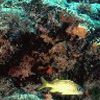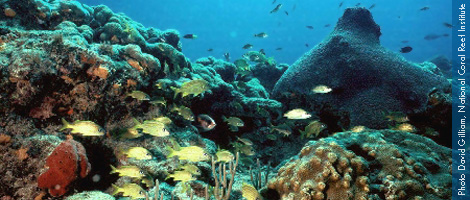 DEP’s Coral Reef Conservation Program helps educate and raise awareness of Southeast Florida’s coral reefs. Leading up to the International Coral Reef Symposium this summer, the Florida Department of Environmental Protection’s (DEP) Coral Reef Conservation Program is encouraging public awareness of coral reefs and their impact on Florida’s marine environment, the commercial and recreational fishing industry and the economy. Recognizing the importance of the state’s reef ecosystem, Florida is the site of the 11th International Coral Reef Symposium, July 7-11, 2008, in Fort Lauderdale, Florida.
DEP’s Coral Reef Conservation Program helps educate and raise awareness of Southeast Florida’s coral reefs. Leading up to the International Coral Reef Symposium this summer, the Florida Department of Environmental Protection’s (DEP) Coral Reef Conservation Program is encouraging public awareness of coral reefs and their impact on Florida’s marine environment, the commercial and recreational fishing industry and the economy. Recognizing the importance of the state’s reef ecosystem, Florida is the site of the 11th International Coral Reef Symposium, July 7-11, 2008, in Fort Lauderdale, Florida.
An extensive, beautiful coral reef ecosystem stretches more than 100 miles along the Southeast Florida coast, from Miami-Dade to Martin County. These reefs are part of the third longest reef system in the world and are one of the greatest natural resources in Florida and the United States. Coral reefs are specialized habitats that provide shelter, food and breeding sites for numerous plants and animals. Reefs form a breakwater for the adjacent coast, providing natural storm protection.
Taking place during the International Year of the Reef 2008, the International Coral Reef Symposium convenes every four years as a major scientific conference to provide the latest knowledge about coral reefs worldwide. Natural scientists, resource managers and users, conservationists, economists, and educators meet together to advance coral reef science, management and conservation. Sponsored in part by the Symposium as well as the National Oceanic and Atmospheric Administration and the International Coral Reef Initiative, the International Year of the Reef is a worldwide campaign to raise awareness about the value and importance of coral reefs and threats to their sustainability.
“Coral reefs are diverse habitats that draw scuba divers and fishermen that boost our economy and they protect our beaches and homes from storm surge,†said DEP Director of Coastal and Aquatic Managed Areas Stephanie Bailenson. “DEP is proud to be a co-sponsor of the 11th International Coral Reef Symposium and join the world in celebrating International Year of the Reef 2008. We appreciate the commitment of all of our partners to ensuring the health and vitality of these precious treasures.â€

DEP’s Coral Reef Conservation Program is raising public awareness by sponsoring two 30-second Public Service Announcements (PSAs) about coral reefs. Airing in both English and Spanish, the PSAs will run throughout 2008 on local television and radio stations in Miami-Dade, Broward, Palm Beach and Martin counties. The program has also produced a video on coral reef protection for area visitors as well as educational DVDs for teachers that provide more than 150 activities for students. In addition, an advanced coral reef training workshop will be held in 2008, as a follow-up course for teachers who participated in previous workshops.
Furthermore, the Coral Reef Conservation Program provides monthly identification classes on corals, fishing and marine invertebrates as well as coral reef protection tips on their Web site.
Tips:
– Use navigational charts to locate coral reefs.
– Anchor to mooring buoys or in sand.
– Stash your trash – Do not dispose of trash, bilge washings, or other debris on or near reefs.
– Don’t touch coral. Coral is made of a hard skeleton, but coral polyps are fragile.
– Avoid trolling for fish above a reef.
Be a smart consumer. Look for the Marine Aquarium Council (MAC) stamp of approval on marine products before purchasing.
“The Coral Reef Conservation Program is dedicated to providing these useful activities so the public will take action and commit to providing for the health and future of coral reefs,†said Chantal Collier, manager of DEP’s Coral Reef Conservation Program.
The State of Florida also manages coral reefs in the Florida Keys National Marine Sanctuary in partnership with the National Oceanic and Atmospheric Association. This partnership has helped monitor and protect this fragile coral ecosystem for 30 years. The Sanctuary Advisory Council supports public involvement in the management process.
The Florida Department of Environmental Protection’s Coral Reef Conservation Program heads the Southeast Florida Coral Reef Initiative, a coalition of more than 70 state, local and federal partners working to protect Florida’s coral reefs. The Initiative is a local action strategy to identify and implement priority actions needed to reduce threats to coral reef resources, including research, monitoring, education and best management practices.
For more information on DEP’s Coral Reef Conservation Program and the Southeast Florida Coral Reef Initiative, visit www.dep.state.fl.us/coastal/programs/coral and www.southeastfloridareefs.net.